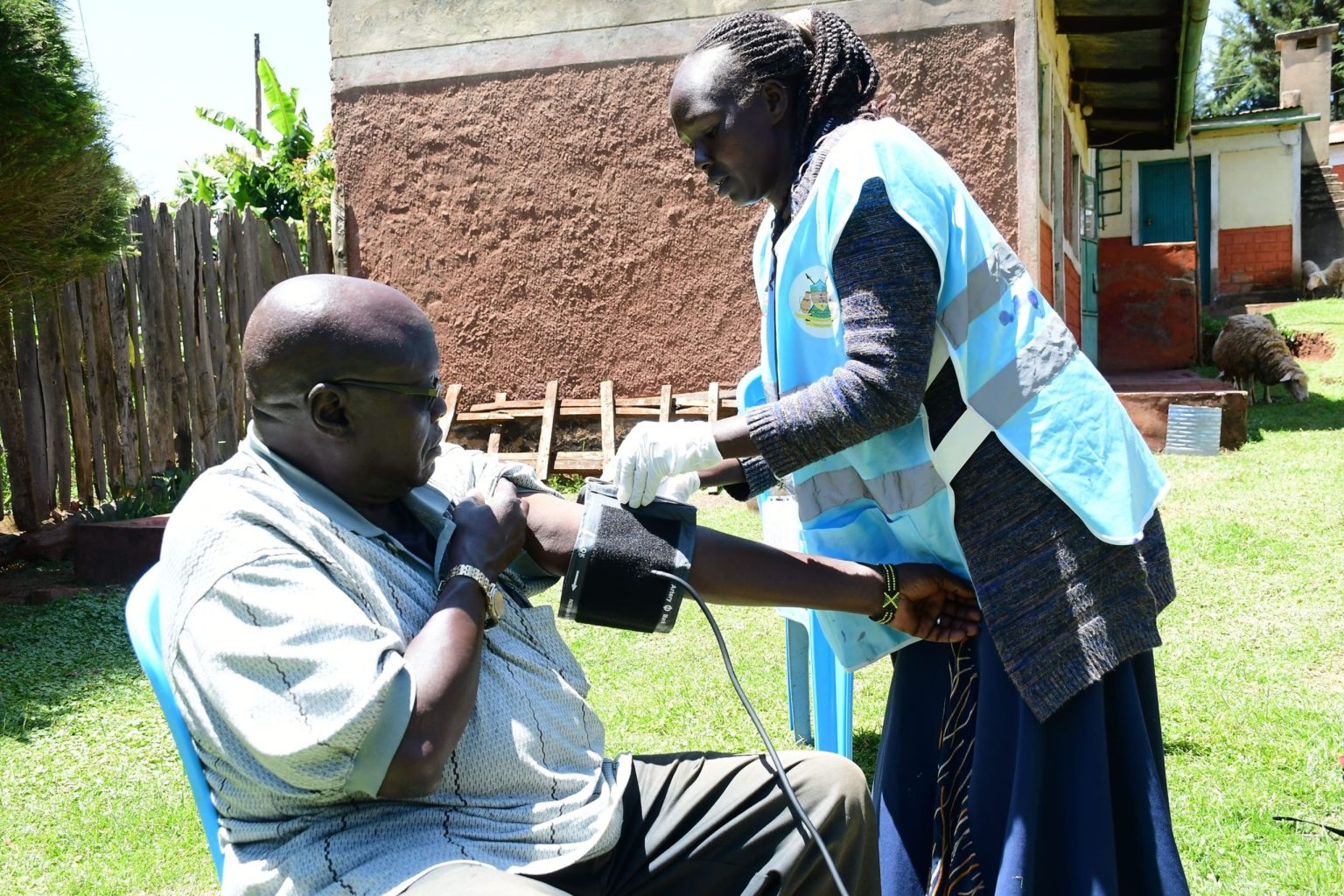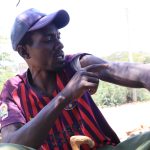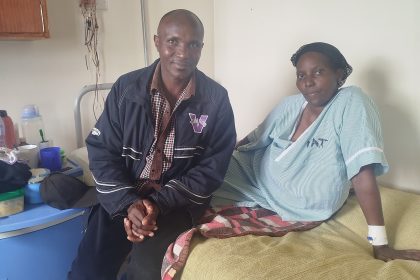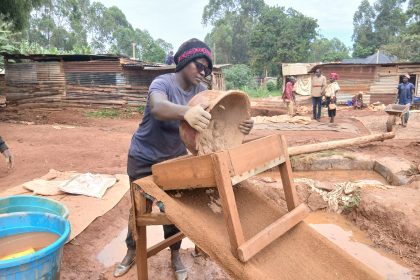Migori County has seen over 600,000 residents screened for diabetes, the highest in Kenya. Community Health Promoters also provide first aid, check blood sugar, offer advice on hygiene and nutrition
Francis Cheboiwo, 73, and his wife Josephine Kiptoo, 69, live in the sleepy village of Koisungur in Iten, Elgeyo Marakwet County.
The couple has been living with undiagnosed hypertension for a long time. Josephine says they have been suffering almost similar symptoms including severe headaches, fatigue and general malaise.
To relieve their symptoms, the couple relied on over-the-counter painkillers, until a few months ago when Josephine’s symptoms got worse.
“I thought I had a bad flu, so I went to a local dispensary where they checked my blood pressure and indicated it was very high. Then they sent me back home,” she says.
Her condition could have worsened if not for Isabella Kiplagat, a Community Health Promoter (CHP) who lives around one kilometre from the Cheboiwo home.
After Josephine’s initial diagnosis at the dispensary, Kiplagat took up her case and made a home visit, during which she checked Josephine’s blood pressure, among other vitals.
Kiplagat also checked Cheboiwo’s vitals and discovered that he, too, was suffering from hypertension. Before then, Cheboiwo had never been diagnosed with hypertension.
“The CHP told me that my blood pressure was too high and likely to cause complications, so she referred us to the Iten County Referral Hospital where we have been receiving treatment,” says Josephine.
“For several months now, through the help of the CHP, my condition has improved. I am following a healthy diet and drinking eight glasses of water with plenty of vegetables,” says Cheboiwo.
Kiplagat, a 42-year-old mother of four, is among 107,831 community health promoters contracted by the government countrywide to work as the link between villagers and formal healthcare facilities. As part of their routine, CHPs conduct home visits, with each promoter assigned to serve 100 households.
During home visits, they provide basic health education such as advice on hygiene and nutrition. They also provide basic first aid, and check vitals like blood pressure and blood sugar. Kiplagat refers villagers to specialists at the Iten County Referral Hospital through a digital toolkit, which she accesses on her smartphone.
CHPs are also required to collect and report data, as well as monitor community surveillance on disease outbreaks like waterborne diseases and malaria, which they do through the Electronic Community Health Information System (eCHIS).
The eCHIS is a digital tool that supports delivery of quality, community health services, by providing support at the household level. The app collects real-time data, which helps to identify health trends, track the spread of disease and monitor the unique health care needs of individual households.
Being in contact with villagers at the household level gives community health promoters an advantage, as they are able to collect raw data from the ground and monitor healthcare dynamics as they unfold.
The Kenya Community Health Policy 2020-2030 recommended the deployment of nationally accredited e-health applications to ensure the quality of community health data collection and reporting hence why eCHIS was created.
Following this recommendation, in October last year, President William Ruto assented to four laws that are expected to improve healthcare in Kenya, even as the government makes strides to achieve its Universal Health Coverage (UHC) plan.
The four laws include the Social Health Insurance Act 2023, the Primary Healthcare Act 2023, the Facility Improvement Financing Act 2023, and the Digital Health Act 2023.
The Digital Health Act 2023 provides for the establishment of a digital health agency and a functional e-health service. According to the Act, the e-health service shall be provided through telemedicine, electronic health records, m-health, e-learning, and telehealth. This is what laid the foundation for eCHIS.
According to data by Amref Health Africa, all health promoters who have smartphones have received the eCHIS tool. For those without smartphones, the Ministry of Health in July distributed 110,000 smartphones equipped with the kit. Only 7,000 CHPs out of a total of 107,831 in the country have not received the eCHIS toolkit.
In areas where community health promoters are actively using the toolkit to register households, the huge impact of eCHIS cannot be ignored. So far, three counties – Homa Bay, Kakamega and Vihiga – have achieved 100 per cent household registration.
Kwale, Bungoma, Siaya, Migori, Elgeyo Marakwet, Nyeri, and Tharaka Nithi counties have achieved over 80 per cent household registration.
Counties whose household registration is between 50-80 per cent include Nyamira, Kisumu, Kitui, Kisii, Makueni, Trans Nzoia and Machakos. Others in this range are Embu, Taita Taveta, Bomet, Nandi, Kilifi, Kirinyaga, Kericho, Marsabit, Turkana, Mandera, Isiolo, Baringo, Kajiado and Uasin Gishu.
However, there has been low household registration in city counties, as well as Arid and Semi-Arid Land (Asal) counties, with Wajir recording the lowest household registration at below 20 per cent. The report attributes this trend to late deployment, whereby CHPs received their tool and data kits after other counties.
Kiambu, Nairobi City, Kajiado, Kirinyaga, Machakos and Nakuru counties have the lowest CHP to household registration ratio; meaning that despite having a high number of health promoters, the number of households registered is unusually low.
Data from the report also shows that some 10,000 CHPs are yet to begin working despite being enrolled on eCHIS, and some two million households are yet to receive services after registration.
In counties that have achieved high CHP enrolment and high household registration, the success of eCHIS is evident.
For instance, in Migori County where household registration is over 80 per cent, some 641,295 residents have been screened for diabetes and 6,087 referred to healthcare facilities through eCHIS. So far, this is the highest number of patients screened for diabetes countrywide.
Also, in Bungoma County, where household registration is over 80 per cent, CHPs have identified 570 underage pregnant mothers and 481 pregnant teenage mothers. These are the highest recorded numbers across the country.
The data generated on the eCHIS toolkit is crucial because it helps the government track the health status of the country’s population and make informed decisions on how to address issues.
In the case of Non-Communicable Diseases (NDCs) like diabetes and hypertension, community health promoters have made great strides in mapping out incidences of the ‘silent killers’. eCHIS data shows that countrywide, CHPs have screened some 4,084,903 people for diabetes, and another 2,793,000 for hypertension. Of these, 56,214 and 140,503 have been referred to healthcare facilities for diabetes and hypertension treatment respectively.
Despite the milestones community health promoters have achieved in linking villagers to healthcare facilities, they face numerous challenges.
One such challenge is little household visits by community health promoters despite high household registration. In addition, despite successful household registration, not all household members are registered, leaving a gap in household data.
There is also a challenge in remuneration, whereby some counties have not paid their community health promoters the monthly stipend of Ksh5,000 funded through the national and respective county governments on a 50-50 basis.
While some 27 counties have consistently been paying their CHPs, 15 counties have not paid them for over nine months since the launch of the programme. These counties are Bomet, Baringo, Garissa, Kajiado, Kericho, Kilifi, Kisii, Laikipia, Mandera, Meru, Narok, Nyamira, Taita Taveta, Tana River, and Uasin Gishu.
Another five counties – Bungoma, Kirinyaga, Muranga, Nyandarua, and Samburu – have accumulated five months of payment arrears.
The Amref Health Africa report recommends regular data review meetings between CHPs and their supervisors, as well as regular supervision of the workers by technical assistants to address challenges as they arise.
The report further recommends validation of household registration to ensure that all members in every household are registered. CHPs working in areas with poor internet connectivity are advised to find suitable well-connected areas where they can synchronize their data on a regular basis.





















